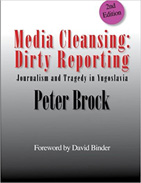
 |
Media Cleansing: Dirty Reporting Journalism and Tragedy in Yugoslavia
by Peter Brock
Graphics Management Press
For the media, warfare opens doors
that can lead to increased prestige, promotion, and even Pulitzer
Prizes. Instead, Peter Brock’s book explains his break from the
journalistic pack to research and pursue truth, even when it would
bring reproach as a reporter.
Why was Brock willing to go against the tide? He had friends among the
inhabitants of what was once Yugoslavia, having frequently visited the
region since the mid-70s. These friends included a Serbian former
physician and a farmer returned after living in America. Both were
proud of their multi-ethnic country and worried about what became known
as the Bosnian war.
Another question is why Western reporters accepted body counts and rape statistics from prejudiced leaders or ham radio operators without cross-checking? Newcomers could not speak the Serbo-Croatian language of officials; interpreters were nationalists. Reporters seasoned by the Vietnam War were looking for the good guys (Muslims) versus bad guys (Serbs). Press members were unaware of 600-year-old warfare that pitted ethnic groups against neighbors, or the ancient atrocities committed. Media personalities, including Peter Jennings and upcoming reporter Christiane Amanpour, supported the Muslims.
Sadly, the eventual cost in Serbian lives was huge. More NATO bombs were dropped on Serbia in 78 days than in Yugoslavia during WWII.
The reader will be surprised to learn about involvement of these influential individuals: George Soros and Osama bin Laden. Was each trying to stop the fighting or simply building a dam for humanitarian purposes? When the war ended, evidence of enforced water restrictions and large numbers of jihadists smack of collusion with Bosnian Muslims. This 328-page work is a profusely documented exposé with footnotes and index. The text is never boring or dry, even with quotes from many resources. Brock’s intriguing chapter and section titles are droll, but straight to the point, as only an expert journalist can manage.
RECOMMENDED by the US Review